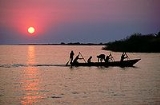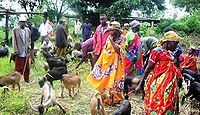
Economy of Burundi
Encyclopedia
Burundi
is a landlocked
, resource-poor country with an underdeveloped manufacturing
sector. The mainstay of the Burundian economy is agriculture
, accounting for 54%of GDP
in 1997. Agriculture supports more than 70% of the labour force, the majority of whom are subsistence farmers. Although Burundi is potentially self-sufficient in food production, the ongoing civil war, overpopulation
, and soil erosion have contributed to the contraction of the subsistence economy
by 25% in recent years. Large numbers of internally displaced person
s have been unable to produce their own food and are largely dependent on international humanitarian assistance. Burundi is a net food importer, with food accounting for 17% of imports in 1997.
of Burundi is coffee
, which accounted for 78.5% of exports in 1997. This dependence on coffee has increased Burundi's vulnerability to seasonal yields and international coffee prices.It generates about 90 percent of export revenues, making the country particularly vulnerable to terms of trade shocks: the current account deficit in 2007 ran at 15 percent of GDP. Coffee is the largest state-owned enterprise. In recent years, the government has tried to attract private investment to this sector, with some success. Efforts to privatize other publicly held enterprises have stalled. Other principal exports include tea and raw cotton.
Burundi is the largest banana market in Africa.
, nickel
, copper
, and other natural resources is being explored, the uncertain security situation has prevented meaningful investor interest. Industrial development also is hampered by Burundi's distance from the sea and high transport costs. Lake Tanganyika
remains an important trading point. The trade embargo
, lifted in 1999, negatively impacted trade and industry. Since October 1993 the nation has suffered from massive ethnic-based violence which has resulted in the death of perhaps 250,000 people and the displacement of about 800,000 others. Foods, medicines, and electricity remain in short supply.
Burundi is heavily dependent on bilateral and multilateral aid, with external debt totalling $1.247 billion
(1.247 G$) in 1997. A series of largely unsuccessful 5-year plans initiated in July 1986 in partnership with the World Bank and the International Monetary Fund attempted to reform the foreign exchange system, liberalize imports, reduce restrictions on international transactions, diversify exports, and reform the coffee industry.
 IMF structural adjustment programs in Burundi were suspended following the outbreak of the crisis in 1993. The World Bank has identified key areas for potential growth, including the productivity of traditional crops and the introduction of new exports, light manufactures, industrial mining, and services. Other serious problems include the state's role in the economy, the question of governmental transparency, and debt reduction.
IMF structural adjustment programs in Burundi were suspended following the outbreak of the crisis in 1993. The World Bank has identified key areas for potential growth, including the productivity of traditional crops and the introduction of new exports, light manufactures, industrial mining, and services. Other serious problems include the state's role in the economy, the question of governmental transparency, and debt reduction.
To protest the 1996 coup
by President Pierre Buyoya
, neighbouring countries imposed an economic embargo on Burundi. Although the embargo was never officially ratified by the United Nations Security Council
, most countries refrained from official trade with Burundi. Following the coup, the United States
also suspended all but humanitarian aid to Burundi. The regional embargo was lifted on January 23, 1999, based on progress by the government in advancing national reconciliation through the Burundi peace process.
Burundi
Burundi , officially the Republic of Burundi , is a landlocked country in the Great Lakes region of Eastern Africa bordered by Rwanda to the north, Tanzania to the east and south, and the Democratic Republic of the Congo to the west. Its capital is Bujumbura...
is a landlocked
Landlocked
A landlocked country is a country entirely enclosed by land, or whose only coastlines lie on closed seas. There are 48 landlocked countries in the world, including partially recognized states...
, resource-poor country with an underdeveloped manufacturing
Manufacturing
Manufacturing is the use of machines, tools and labor to produce goods for use or sale. The term may refer to a range of human activity, from handicraft to high tech, but is most commonly applied to industrial production, in which raw materials are transformed into finished goods on a large scale...
sector. The mainstay of the Burundian economy is agriculture
Agriculture
Agriculture is the cultivation of animals, plants, fungi and other life forms for food, fiber, and other products used to sustain life. Agriculture was the key implement in the rise of sedentary human civilization, whereby farming of domesticated species created food surpluses that nurtured the...
, accounting for 54%of GDP
Gross domestic product
Gross domestic product refers to the market value of all final goods and services produced within a country in a given period. GDP per capita is often considered an indicator of a country's standard of living....
in 1997. Agriculture supports more than 70% of the labour force, the majority of whom are subsistence farmers. Although Burundi is potentially self-sufficient in food production, the ongoing civil war, overpopulation
Overpopulation
Overpopulation is a condition where an organism's numbers exceed the carrying capacity of its habitat. The term often refers to the relationship between the human population and its environment, the Earth...
, and soil erosion have contributed to the contraction of the subsistence economy
Subsistence economy
A subsistence economy is an economy which refers simply to the gathering or amassment of objects of value; the increase in wealth; or the creation of wealth. Capital can be generally defined as assets invested with the expectation that their value will increase, usually because there is the...
by 25% in recent years. Large numbers of internally displaced person
Internally displaced person
An internally displaced person is someone who is forced to flee his or her home but who remains within his or her country's borders. They are often referred to as refugees, although they do not fall within the current legal definition of a refugee. At the end of 2006 it was estimated there were...
s have been unable to produce their own food and are largely dependent on international humanitarian assistance. Burundi is a net food importer, with food accounting for 17% of imports in 1997.
Agriculture
The main cash cropCash crop
In agriculture, a cash crop is a crop which is grown for profit.The term is used to differentiate from subsistence crops, which are those fed to the producer's own livestock or grown as food for the producer's family...
of Burundi is coffee
Coffee
Coffee is a brewed beverage with a dark,init brooo acidic flavor prepared from the roasted seeds of the coffee plant, colloquially called coffee beans. The beans are found in coffee cherries, which grow on trees cultivated in over 70 countries, primarily in equatorial Latin America, Southeast Asia,...
, which accounted for 78.5% of exports in 1997. This dependence on coffee has increased Burundi's vulnerability to seasonal yields and international coffee prices.It generates about 90 percent of export revenues, making the country particularly vulnerable to terms of trade shocks: the current account deficit in 2007 ran at 15 percent of GDP. Coffee is the largest state-owned enterprise. In recent years, the government has tried to attract private investment to this sector, with some success. Efforts to privatize other publicly held enterprises have stalled. Other principal exports include tea and raw cotton.
Burundi is the largest banana market in Africa.
Industry
Little industry exists except the processing of agricultural exports. Although potential wealth in petroleumPetroleum
Petroleum or crude oil is a naturally occurring, flammable liquid consisting of a complex mixture of hydrocarbons of various molecular weights and other liquid organic compounds, that are found in geologic formations beneath the Earth's surface. Petroleum is recovered mostly through oil drilling...
, nickel
Nickel
Nickel is a chemical element with the chemical symbol Ni and atomic number 28. It is a silvery-white lustrous metal with a slight golden tinge. Nickel belongs to the transition metals and is hard and ductile...
, copper
Copper
Copper is a chemical element with the symbol Cu and atomic number 29. It is a ductile metal with very high thermal and electrical conductivity. Pure copper is soft and malleable; an exposed surface has a reddish-orange tarnish...
, and other natural resources is being explored, the uncertain security situation has prevented meaningful investor interest. Industrial development also is hampered by Burundi's distance from the sea and high transport costs. Lake Tanganyika
Lake Tanganyika
Lake Tanganyika is an African Great Lake. It is estimated to be the second largest freshwater lake in the world by volume, and the second deepest, after Lake Baikal in Siberia; it is also the world's longest freshwater lake...
remains an important trading point. The trade embargo
Embargo
An embargo is the partial or complete prohibition of commerce and trade with a particular country, in order to isolate it. Embargoes are considered strong diplomatic measures imposed in an effort, by the imposing country, to elicit a given national-interest result from the country on which it is...
, lifted in 1999, negatively impacted trade and industry. Since October 1993 the nation has suffered from massive ethnic-based violence which has resulted in the death of perhaps 250,000 people and the displacement of about 800,000 others. Foods, medicines, and electricity remain in short supply.
Burundi is heavily dependent on bilateral and multilateral aid, with external debt totalling $1.247 billion
1000000000 (number)
1,000,000,000 is the natural number following 999,999,999 and preceding 1,000,000,001.In scientific notation, it is written as 109....
(1.247 G$) in 1997. A series of largely unsuccessful 5-year plans initiated in July 1986 in partnership with the World Bank and the International Monetary Fund attempted to reform the foreign exchange system, liberalize imports, reduce restrictions on international transactions, diversify exports, and reform the coffee industry.

To protest the 1996 coup
1996 Burundian coup d'état
The 1996 Burundian coup d'état was a military coup d'état that took place in Burundi on 25 July 1996. In the midst of the Burundi Civil War, former president Pierre Buyoya deposed Hutu President Sylvestre Ntibantunganya. According to Amnesty International, in the weeks following the coup, more...
by President Pierre Buyoya
Pierre Buyoya
Major Pierre Buyoya is a Burundian politician who has ruled Burundi twice, from 1987 to 1993 and from 1996 to 2003...
, neighbouring countries imposed an economic embargo on Burundi. Although the embargo was never officially ratified by the United Nations Security Council
United Nations Security Council
The United Nations Security Council is one of the principal organs of the United Nations and is charged with the maintenance of international peace and security. Its powers, outlined in the United Nations Charter, include the establishment of peacekeeping operations, the establishment of...
, most countries refrained from official trade with Burundi. Following the coup, the United States
United States
The United States of America is a federal constitutional republic comprising fifty states and a federal district...
also suspended all but humanitarian aid to Burundi. The regional embargo was lifted on January 23, 1999, based on progress by the government in advancing national reconciliation through the Burundi peace process.

